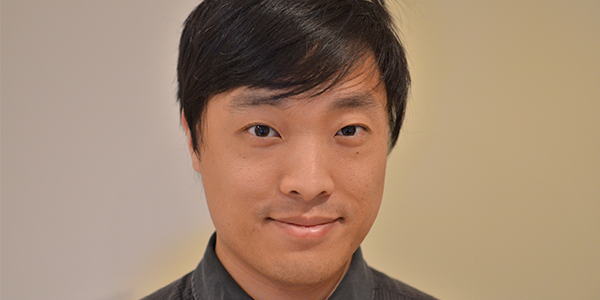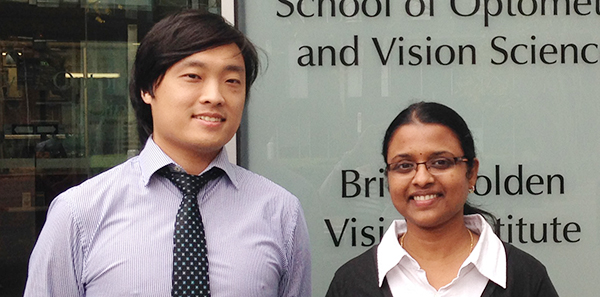1:30min

Dr Jack Phu. Photo, UNSW School of Optometry and Vision Science
By Helen Carter
Journalist
Talented early career optometrist Dr Jack Phu is the first Australian to receive the American Academy of Optometry Foundation’s Beta Sigma Kappa research fellowship and will use the funds to progress his research to tailor glaucoma treatment.
Dr Phu is Head of the Glaucoma Unit, leads the Angle Closure Disease Clinic and is an Associate Lecturer at the Centre for Eye Health, University of New South Wales, School of Optometry and Vision Science.
The American Academy of Optometry Foundation in collaboration with the Beta Sigma Kappa International Optometric Honor Society announced on September 29 that he was the 2020 recipient of the Beta Sigma Kappa (BSK) Research Fellowship.
The fellowship is designed to provide support for early career optometric and vision science faculty research and will fund Dr Phu’s project on phenotyping open-angle glaucoma subtypes to determine disease prognosis. It is the second Academy award he has received for glaucoma research but this time it is to see if risk stratification for glaucoma patients will work, categorising them into profiles ranging from low to high risk for progression to blindness.
‘The research also aims to show if this stratification would help determine frequency of monitoring – whether patients are low or high risk so should see their optometrist annually or every three months, for example – as well as determine treatment intensity and type, such as frequency and dose of eye drops and whether laser treatment is needed,’ Dr Phu told Optometry Australia.
‘The ultimate aim is to have glaucoma treatment tailored for each patient.
‘We earlier this year published some work in Ophthalmology Glaucoma on this method for identifying clinical features distinguishing newly diagnosed glaucoma and suspects. By applying this method to a diverse cohort of glaucoma patients, we hope to know within the next six to eight months whether we can do this risk stratification and its potential practical applications.’
Dr Phu plans to use the US$4,000 fellowship to employ a research student to work on the project and hopes to trigger in them a passion for glaucoma research.
‘With open angle glaucoma there are many different parameters. We are trying to see if we can separate patients into those with phenotypes for slower or faster rates of progression and those who may progress to blindness and others who won’t,’ he said.
‘The goal of the research is to try to identify features within clinical tests to separate subgroups of glaucoma patients, so we will know who needs earlier and more aggressive treatment, compared with who does not. We will aim to stratify them into risk groups, providing more tailored treatment, and this will intensify how we monitor frequency.
‘It’s a great honour to receive this award, I acknowledge past recipients have gone on to do many wonderful things and I hope I can too,’ Dr Phu said.
‘The academy conference will be virtual this year, from October 7 to 22, which means there will be many more attendees including Australians which is great.’

Jack Phu and Preeji Mandathara when they received their 2016-2017 Ezell Fellowships. Photo, UNSW School of Optometry and Vision Science
When Jack was a PhD student, he received the 2016-2017 William C Ezell Fellowship from the Foundation, the philanthropic arm of the Academy which provides financial support for optometric research and vision and eye health education to improve patient clinical care. The award enabled him to continue his research on the early detection of functional loss in glaucoma, trying to optimise visual field parameters to detect more changes in patients with early stage glaucoma and improve the structure-function relationship between the optic nerve and visual field parameters.
As a clinician-scientist, Dr Phu’s roles within the Centre for Eye Health encompass clinical, research and teaching activities. His clinical activities are focussed almost exclusively on the care of patients with glaucoma and the emphasis of his research is clinically applicable work, with the aim of directly impacting patient care. Recent examples of this have included his publications examining the application of SITA-Faster and the 24-2C visual field test grid in glaucoma patients.
His research supports the delivery of clinical service with three primary arms; basic science (clinical psychophysics and statistical analytical techniques); clinical research (development and application of novel test paradigms in patients to compare against current clinically available tools); and health care pathways (development and assessment of new modalities of eye health care delivery to optimise patient care.)
Glaucoma webcast for Optometry Australia members
Dr Phu has also been involved in several Optometry Australia projects including a recent webcast on glaucoma care and the future for members. He attended Optometry Australia’s 2019 ECO Think Tank and is on the Optometry NSW/ACT inaugural committee for its Early Career Optometrists NSW/ACT (ECONA) group where he is keen to push an agenda of progressive and innovative practice to improve patient care.
He has spoken about glaucoma at several of our conferences including at WAVE2017 where he advised optometrists could enhance their management of glaucoma patients by ensuring patients were aware of potential ‘cosmetic’ side-effects before starting treatment, discussed pre-perimetric glaucoma at an Optometry NSW/ACT CPD conference in Canberra and spoke about glaucoma red flag showdown at Super Sunday 2020. He has written about pregnancy and glaucoma in Pharma.
Optometry Australia members who missed the webcast can watch Glaucoma Care and the Future at this link and receive 2T independent CPD points.
Tagged as: Awards - honours - grants-bursaries, Glaucoma, International, Universities